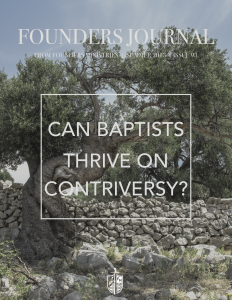The 19th-Century Response to the Rise of Campbellism
When the followers of Alexander Campbell attempted to insert themselves into Baptist life in the 1820s, they were rebuffed. When they subsequently courted Baptists to join their ranks in their independent churches throughout the following decades, scores of Baptist ministers and Baptist newspaper editors rose up to decry such defections. The Campbellites asserted that their position was the true position of the “ancient church,” who preached the “ancient gospel,” and they appealed to Baptists to lay aside their denominational prejudices and embrace their movement. Exacerbating the tension was the apparent similarity between Baptists and Campbellites on many points that had previously united Baptists against other denominations. In light of this challenge, Baptists brought forth other elements of their doctrinal identity to distinguish themselves from those who seemed to be of like mind regarding many essential Baptist positions.
At what points did the Disciples differ from the Baptists? This conflict demonstrates that Baptists saw themselves in terms of historic orthodoxy, reformed evangelicalism, a two-fold confessionalism, all as necessary elements in a theologically-integrated ecclesiology.
HISTORICAL CONTEXT
Alexander Campbell was born September 12, 1788 in Ballymena, County Antrim, Ireland. After immigrating to the United States in his early twenties, Campbell labored in ministry first among the Presbyterians and then among Baptists in Pennsylvania before moving to Bethany, Virginia. Campbell’s remarkable influence along the frontier was due largely to his unique message of unity against the backdrop of the Second Great Awakening in the western states. Campbell, like many, had become frustrated by the rivalry among denominations in the wake of the revival, and he sought to restore the “ancient church” by preaching the “ancient gospel,” free from the sectarian arrogance. Nathan Hatch observes, “Like many of his generation, Campbell believed that stripping away the accretions of theology and tradition would restore peace, harmony, and vitality to the Christian Church.”1 By 1830, Campbell’s followers numbered over 22,000, and his publication, The Millennial Harbinger, reached readers across a wide swath of the United States. By the advent of the Civil War, Disciples or “Reformers,” as they came to be called, numbered 190,000.2
Campbell vigorously opposed denominations and the party spirit that seemed to pervade the United States in the midst of the religious fervor following the Second Great Awakening. He instituted what was in his mind a movement of reform, aimed at uniting all Christians under the one original banner, free from the strictures of denominational control and influence, especially as embodied in creedal statements. Campbell saw himself as a great reformer in the line of those whom God raised up in the 16th century to combat Roman Catholicism. Campbell, however, felt that no sooner had Protestants freed themselves from the shackles of the Pope than
a secret lust in the bosoms of Protestants for ecclesiastical power and patronage worked in the members of the Protestant Popes, who gradually assimilated the new church to the old. Creeds and manuals, synods and councils, soon shackled the minds of men, and the spirit of reformation gradually forsook the Protestant church, or was supplanted by the spirit of the world.3
In truth, the reform movement that Campbell inaugurated was not entirely new and did originate across the Atlantic; however, its roots stretched back only a century and only to Scotland.4
Roots in Sandemanianism
Campbell’s father, Thomas, “was a Seceder minister in the Anti-Burgher branch” of Presbyterianism. Due to financial difficulties, the elder Campbell sailed for the United States in April of 1807. Alexander remained behind with his mother and siblings and, eventually attended the University of Glasgow where he befriended Greville Ewing, a university professor and follower of the Sandemanians. The founder of Sandemanianism was John Glas, a Scottish Presbyterian minister who objected to the Westminster Confession of Faith at a few particular points. Specifically, Glas argued for the separation of church and state and that the true church was to be composed only of those who had experienced a genuine work of grace. Above all, he resolved that he should “take to himself no other rule but the word of God.”5 By 1725, Glas had formed his own religious societies of only regenerate persons, a move which resulted in his expulsion from the Kirk of Scotland in 1730. Undeterred, Glas and his followers (named Sandemanians due to the influence of his son-in-law, Robert Sandeman) established their own independent congregations. Within a few decades, the Sandemanians had further splintered, dividing over a host of issues including the ordinances, ministerial compensation, the nature of the Sabbath, and ecclesiology. Nevertheless, they remained united in their antagonism toward any formal confession or doctrinal standard, the trait that became their unifying principle.6
Under the influence of Ewing, Campbell became enthusiastic with Sandemanian ideals. Several shifts in Campbell’s thinking can be traced to his association with Ewing, such as a reduction of faith to the exercise of the intellect,7 the diminished role of the Holy Spirit in conversion, the nature of true church as comprising only believers, and the selection and role of officers in the church. Campbell even adopted much of the vocabulary of the Sandemanians, employing terms like “ancient gospel,” and “ancient church” to describe the ideal which he sought. Like Glas, he felt disdain for the “popular preachers” and held tenaciously to the maxim, “Where the Scriptures speak, we speak; where they are silent, we are silent.”8
Retreat from Presbyterianism
Upon arriving in the United States in 1809, Alexander Campbell joined his father in Pennsylvania and found him in the same frame of mind regarding the Presbyterian form of church government and its adherence to creeds. Thomas Campbell was censured by the Presbytery of Chartiers in 1809 for schismatic practices and teachings, and, seeing that he stood little chance of being exonerated by the Associate Synod of North America, he formally resigned his position within the presbytery and constituted his own congregational church with Alexander.9
The birth of Alexander’s daughter in 1811 sealed his break with the Presbyterians. Campbell concluded that infant baptism was unbiblical and that baptism was to be administered only to believers. Convincing the majority of his congregation to follow suit, they were immersed by a nearby Baptist minister, and they constituted themselves afresh, excluding those who would not conform. His attempt to institute the pure church and create unity was thus initiated through separation and disjunction.10
Rivalry with Baptists
Though he now practiced baptism by immersion, there were signs that Campbell’s tenure among Baptists would be short-lived. Campbell’s church at Brush Run applied for admission to the Redstone Baptist Association in Pennsylvania, and they were accepted into fellowship despite the protest of some ministers who questioned Campbell’s views on baptism and his refusal to accept the Philadelphia Confession, the standard of the Association.11
While preaching through regions of Kentucky, Campbell became a prominent debater with Presbyterians over the mode of baptism. His skill in debate won him wide acclaim, but it soon became obvious to those most familiar with his arguments that he was teaching what amounted to baptismal regeneration, namely that baptism was for the remission of sins. Campbell’s theological system also involved features that prompted hostility from Baptists, such as the denial that regeneration must precede faith. Campbell began disseminating his views in his own paper, The Christian Baptist, in what many saw as a usurpation of the label. By 1830, numerous associations in Kentucky, Indiana, and Illinois had weighed in and excluded churches espousing Campbellite theology.12 When it was clear the title was no longer expedient, Campbell subsequently ceased its publication and instituted The Millennial Harbinger.13
Campbell would continue writing and preaching up to his death on March 4, 1866. Due to their geographic proximity and the similarity of their practice of immersion, the primary rivals of the Campbellites were the Baptists. Exactly where and how they differed was itself a matter of controversy.
CAMPBELL’S THEOLOGICAL COMMITMENTS
Because Campbell was committed to the eschewing of any formal creeds, determining his precise theological position on any given doctrine or practice was decidedly difficult. Baptists who engaged Campbellite theology were quick to note this frustrating feature of the Reformers’ movement, and they were frequently charged with misrepresenting Campbellite theology. The primary locus of Campbell’s teachings were restricted to The Millennial Harbinger, which over the course of time would publish seemingly contradictory statements on a particular issue.14 Campbell did, however, crystallize his teaching in his work, The Christian System, originally published in 1839. In The Christian System, Campbell articulates what he believed the Bible taught regarding doctrines such as the fall of man, the essence of saving faith, immersion, conversion, regeneration, etc.
According to Campbell, mankind was in a state of fallenness. Man’s chief problem, however, was not that he was dead in his sins, but rather that he now had a bent toward sinfulness. For Campbell, the remedy for man’s fallen state is found ontologically in the sacrificial death of Christ, yet the way in which this remedy is applied to the individual sinner is through his rationality.
Campbell argued that “faith in Christ is the effect of belief,” which itself is the mental assent of certain facts.15 Upon a person’s profession of faith and repentance from sin, he becomes an appropriate candidate for baptism. According to Campbell, baptism “has no abstract efficacy. Without previous faith in the blood of Christ, and deep and unfeigned repentance before God, neither immersion in water, nor any other action, can secure to us the blessings of peace and pardon; it can merit nothing.” He continues, “Still, to the believing penitent it is the means of receiving a formal, distinct, and specific absolution, or release from guilt.”16 For Campbell, the conversion of a sinner is “the change which is consummated by immersion,” and he argues that regeneration is not to be confused with the process of conversion.17
Regeneration itself is moral and physical, and it is effected in a man when he realizes by the impression of the Word upon his heart that God loves him in spite of his sinfulness, and he is thus moved to love God in return. Hence, Campbell asserts, “The grand principle, or means which God has adopted for the accomplishment of this moral regeneration, is the full demonstration and proof of a single proposition addressed to the reason of man [emphasis added]. This sublime proposition is, that God is Love.”18 Campbell continues, “The change of heart and of character, which constitutes moral regeneration, is the legitimate impression of the facts or things which God has wrought.”19
J. B. Jeter was the first to issue a formal response to the teachings of Campbell in the form of a full monograph, Campbellism Exposed, published in 1855. Jeter’s work was widely read by those who interacted with the Reformers, and it was steadfastly denounced by the Disciples as misconstruing the theology of Campbell. Campbell himself vowed a rebuttal, but instead the task fell to his young and promising protégé, Moses E. Lard. Lard’s response was more detailed than Campbell’s original systematic exposition, and for Baptist detractors, Lard’s work stood as the best encapsulation of the views of Alexander Campbell, if not the entire Reformers’ movement.
THE BAPTIST RESPONSE – DEFINING AN IDENTITY
The Baptist response to Campbellism did not depend upon the refutations of a few individuals. In fact, the first opposition to Campbell occurred in his earliest days as an immersionist in Pennsylvania. Furthermore, opposition to his theological positions was already vocal and rigorous in regions as far west as Illinois by 1830, not to mention the regions of Kentucky, Ohio, Virginia and Tennessee that were the heart of Campbellism.20
Baptists were well known for their disputations with Methodists and Presbyterians over matters of distinction, like the mode of baptism and the nature of the church. The response to the Campbellites, however, was of a different character altogether because Baptists agreed with Campbellites on many of these so-called distinctives, yet they vigorously opposed them on more substantial matters. Baptists also relentlessly opposed Campbell’s followers for perceived usurpation of their own identity, namely the identity of being a true Baptist. Hence, the confrontation forced Baptists not only to define issues like believers’ baptism, but the larger framework of theology whereby Campbellites were necessarily excluded from their fold.21
Orthodoxy
The foundational issue for Baptists was clearly orthodoxy. It was not uncommon for many Baptist rebuttals of Campbellite positions to begin with the concession that the Reformers were orthodox, as respecting the great doctrines of the Trinity and the person of Christ. Such a concession reveals implicitly that to be Baptist first required other, more basic commitments to the faith once for all delivered to the saints.
The reason for stringently examining the views of the Campbellites with respect to doctrines like justification, sanctification, regeneration, baptism, etc., is because the Disciples met the threshold for what was necessary to be considered “Christian.” There are few occasions of published debates between Baptists and Mormons, Unitarians, or other groups that failed to subscribe to essential orthodox positions.
One historical feature of this agreement over issues of orthodoxy is the attempt at ecclesiastical union between Baptists and Disciples in some locales, including Virginia and Ohio. The original call for an investigation into the terms of union in Virginia was initiated by W. F. Broaddus, a prominent Baptist leader in the state, published in a January editorial of The Religious Herald.22 In Ohio, the overtures came from the side of the Disciples, who went so far as to issue a statement highlighting perceived areas of agreement between the two camps. A delegation of Disciples delivered their statement to the Baptist state convention meeting in Columbus. Among the brief statements were the following assertions of orthodoxy:
1. The divine authenticity an [sic] authority of the Holy Scriptures of the Old and New Testaments as a revelation from God to man.
2. The divine authority and sufficiency of the New Testament as a revelation of salvation through Jesus Christ, and as a rule of faith and practice for Christians.
3. The revelation of God therein in the threefold manifestation of Father, Son, and Holy Spirit, in the great work of human redemption.
4. The divinity of Jesus as the Son of God, and his Messianic offices of Prophet, Priest, and King, to enlighten us by his teachings, to redeem us by his sin-offering, to rule over us by his kingly authority, and guide us to eternal life.
5. The mission of the Holy Spirit, to convict the world of sin, righteousness and judgment, and to abide with the saved as a divine Comforter—the earnest of the heavenly inheritance.23
Such statements were encouraging to many Baptists, for they showed that despite their reticence toward confessions, Disciples were somewhat willing to employ theological language in order to build bridges with other Christians. Clearly the article upon which Baptists shared the most with the Reformers was their high view of Scripture.
Not everyone within the Baptist fold gave the Disciples the benefit of the doubt regarding their orthodoxy, however. In an open letter published by The Western Recorder, A. H. Strong questioned the proposed fraternization of Baptists and Campbellites in Ohio. Strong references this general statement of faith offered by the Disciples at the meeting in Columbus, but finds it deficient.
I desire, also, before going further in this direction, to have most serious attention given to the articles of faith presented by these brethren, lest the mere sound of orthodoxy be mistaken for the substance. So far am I from assenting to the opinion that upon the presentation of just such articles alone, any Baptist council would recognize a church or ordain a minister, that I see in almost every one of these articles ambiguities which I should wish most carefully explained before accepting those who offered them as sound of belief. Not to mention minor criticism, I see in the third article no intimation that these brethren are not Sabellians, believers in a mere trinity of divine manifestations, instead of a trinity of eternal distinctions, immanent in the divine nature. For aught I can see, one might profess this third article as his belief and still deny that either the Son or the Holy Spirit were in any proper sense persons of the Godhead. I see in the fourth article no clear recognition of the essential and proper Deity of Jesus, nor any expression which a Unitarian might not adopt. I see in the fifth article neither a declaration of the Deity of the Holy Spirit, nor any intimation that pre-baptismal love is the work of the Spirit in the soul.24
Even if one grants that the Disciples were actually orthodox in their Christology and pneumatology, too many differences remained for any such union to be genuinely possible. These differences were with respect to those doctrines and beliefs one might classify as “evangelical.”
Evangelicalism
For Baptists, orthodoxy could not be sufficient for ecclesiogical or denominational union. J. M. Dudley notes that in spite of the supposed harmony on issues of orthodoxy, the areas of difference render the prospect of ecclesiological unity virtually impossible.25 As previously noted, the Baptist distinctive of baptism of believers only by means of immersion was in some senses shared by Campbellites. However, a perusal of the periodicals of the day reveals intense debates between Baptists and Disciples over the ordinance. What could possibly divide two camps in such a hostile manner over an issue upon which they seemingly agreed? The answer is the proper subject of baptism; specifically, what qualifies a person to be a candidate for Christian baptism? While both groups would answer repentance and faith, the definitions of these terms offered by both sides differed dramatically. The reason for this chasm was the difference in soteriology.
The beginning of the debate frequently centered upon the extent or character of man’s fallen nature.26 This was the starting point of Baptist soteriology; to ascertain the necessary elements of salvation, one must first deduce the condition from which man must be delivered. J. M. Peck, editor of The Western Baptist, asserts the following as the model “which is generally maintained by intelligent Baptists both in England, and the United States:”
The mind of a sinner before conversion is opposed to God—it is a carnal mind—at enmity against God. The sinner does not merely mistake about God and the gospel method of salvation. He does not merely labor under the influence of ignorance. He is not merely deficient in the knowledge of divine things. His heart is deceitful above all things and desperately wicked. His inability consists in a wicked heart, and this is shown forth in disobedient conduct. For this wicked heart he is wholly to blame…27
The total depravity of man was not merely an abstract doctrine, but a foundational truth upon which the scheme of regeneration rested. The reason mankind required a total salvation is because he was totally, not merely intellectually, ruined. Peck further illustrates this relationship:
But the sinner will not turn when he is exhorted. His heart is opposed to God—he loves sin—and goes on though he knows it will ruin him. Hence the necessity of the Holy Spirit to change his heart—to form the image of Christ within him. And the Holy Spirit does change the sinner’s heart, and work within him to will and to do the good pleasure of God.28
Hence, the depravity of man, if denied, removes the need for any true work of regeneration by the Spirit. Since the Campbellites made this denial, the resulting doctrines were thus the logical conclusion and necessary outworking of rejecting total depravity, as we shall see.
Moses Lard defined faith as “the simple conviction that what the bible says is true.”29 To have faith is to believe, merely with mental assent, that God exists, that His law condemns sinners, and that Jesus Christ is the proper Savior for man. R. M. Dudley, the editor of The Western Recorder, takes exception to this definition, arguing that this is merely historical faith, the same faith held by the demons and by Satan himself, and it is therefore insufficient to save anyone. Furthermore, Lard relegates repentance to an act merely of the will and one which follows faith. Dudley challenges this assertion, noting that the Scripture prescribes both faith and repentance in order to be saved. Dudley further rebuts that repentance is wrought in the heart of a sinner prior to his exercising of faith, just as a sick person must be brought to awareness of his disease before he will seek out a physician.30 Lard’s view is similar to other Campbellites, such as one Dr. Hopson. The following summary of Hopson’s view of faith and repentance demonstrates the process of salvation in Campbellite theology from start to finish:
[This] truth when believed and obeyed makes men free from the bondage of sin and introduces them into the family of God as adopted children. The mind of man is composed of three parts—the intellect or the understanding, the sensibilities and the will. Spiritual truth, like all other truth, in order to be believed must be presented to the intellect and must be accompanied by such evidence as is sufficient to convince the understanding. Every step in the process of reaching the conclusion arrived at is intellectual; and if the result is the acceptance of the proposition as true, that judgment of the mind is belief, or faith, which two terms are of the same import, since they represent the same Greek word. The proposition to be believed by one who would be saved is, “Jesus is the Christ the Son of God.” This is presented by the Holy Spirit to the intellect; and it will be believed or disbelieved as it may seem to be sustained or unsustained by the evidence adduced in its support. When the truth of the proposition has been accepted, then the will is operated upon by the Spirit through the word, commanding the believer to reform, or to change his purpose; and when the will resolves to make the change required, then the newly formed purpose is to be carried into execution by obedience to the command, be immersed.31
As this summary shows, the role of the Spirit in the conversion of sinners was, for Campbellites, one of presenting propositional truth to the mind of sinners. The Spirit exercised no real activity, but was only present within the truth. There is no wonder, then, that Baptists attacked Campbellite theology on the grounds that it undermined the doctrine of regeneration and minimized the person and work of the Holy Spirit. A. P. Williams attacks Campbellites precisely at this point. He summarizes the views of Lard, “He does not believe that the Spirit operates. He believes that the truth operates because it is of the Spirit. He believes that the power by which it operates is now in it. And that the Holy Spirit can not increase this power without infringing the freedom of the human will.” What follows is a quote from Lard: “An influence more intense than that of Divine truth, and above it, would of necessity infringe the freedom of the human will, and hence can not be admitted to be present in conversion.” To this, Williams replies, “Now, I ask, can the man who wrote the above sentence believe that the Holy Spirit now operates in conversion? I can not think that he does.”32
This entire scheme of man’s limited depravity and the rational nature of conversion opened the Campbellites to the charge of rationalism. In his critique of Moses Lard, Jeter demonstrates how certain tenets within Campbellism devolve into rationalism. First, they reduce total depravity to mere peccability, nothing more than a liability to sin and a personal infirmity. Secondly, though they do not formally reject the agency of the Spirit in conversion, they restrict His influence to only that which is upon the mind of the sinner through propositional truths. In other words, there is no experience of being brought to life or regenerated by the Spirit. “A man, according to the system, becomes a Christian, by his own unaided powers, without prayer, precisely as he would become an Odd Fellow or a Son of Temperance, except that in the latter case he would be moved by uninspired and the former by inspired arguments… Conversion, instead of being a Divine change, comprehending a new heart—a new life—a partaking of the Divine nature—is a reformation originating simply in the force of truth and ending in immersion.”33 Hence, if the essence of saving faith is reduced merely to assent to propositional truth, and if regeneration is simply a moral process whereby man’s heart changes to love God naturally because he apprehends with his mind that God loves him first, then the charge of rationalism is indeed a fitting one. Such a religion is devoid of any true spiritual character.
The most noxious doctrine of the Reformers was their perversion of the design of baptism. According to Baptists, the Campbellite view amounted to baptismal regeneration.34 Ironically, Some Baptists were willing to express more charity toward those who held a different mode of baptism than they were toward the Reformers who perverted its design. S. Baker seeks to demonstrate that immersion cannot be the cause of regeneration by offering as proof the examples of men such as Calvin, Edwards, and Baxter. Though these men were never immersed, yet no one acquainted with their works would ever question if they were indeed regenerated.35
Equally dangerous is the idea that baptism provides the remission of sins. In “Remission of Sins Through Faith in Christ,” Joseph Weaver sets forth the Baptist position that remission of sins is possible only through the atonement of Christ as He personally suffered for the sins of His people. Remission is granted to those who are united to Christ in faith. It is not, therefore, granted on the basis of human repentance or baptism, but only upon faith.36 Compare this with the Campbellite assertion, “That faith, repentance, and immersion are necessary to the remission of sins, and the remission is guaranteed on no other conditions.”37
Modisett emphasized the danger of the Campbellite doctrine by highlighting its similarity to the system of the Mormons. “Now, is it not true, that in the fundamental doctrine of remission of sins, and final salvation of men, the boasted Reformation, and the infamous system of Mormonism are identically one and the same, in holding and teaching that immersion in water is essential to remission of sins, and final salvation?”38
J. W. Rust was glad to see the acrimony between Disciples and Baptists in Ohio abating, and he was encouraged by the aforementioned short doctrinal statement of Disciples, intending to highlight points of agreement between the two groups. Nevertheless, he opines that union between the two would never be possible as long as their theological identities remained as they were. Specifically, he challenged the Disciples on the evangelical points:
There is something very plausible on the surface of the above proposed platform of common faith [i.e. the statement previously referenced], but what lies beneath the surface! We would ask our Ohio friends of the “Current Reformation” if they believe in the personal presence and direct operation of the Holy Spirit on the spirit of man in what is called regeneration, or do they still cling to their former view that the Word is all sufficient and that all the power known in the Gospel consists in arguments addressed to the understanding, and in persuasions addressed to the heart. We would ask them if they still hold to their former view that baptism is necessary to the remission of sins, and no matter how strong and firm may be a man’s faith in Christ as his Saviour, he is not in a state of salvation until baptized. Now upon these points there is a radical difference between Baptists and Reformers… When Baptists cease to believe and preach regeneration by the Spirit of God, justification by faith in Christ—“without deeds of law,”—or when the Reformers cease opposing these views and become willing to accept them, let the subject of union be agitated.
Confessionalism
The oft-repeated Campbellite slogan, “No Creed but the Bible,” at first perhaps sounds like a Baptist ideal. Indeed, many Baptists invoked this very phrase for their own purposes when distinguishing themselves from Presbyterians and other denominations. The freedom to adhere to the Bible alone above all ecclesiastical structures is part of the Baptist heritage. Despite this apparent similarity, however, Baptists interpreted this freedom differently than did the Disciples. The freedom from oppression of a creed was not, for Baptists, a cause to impugn all confessional statements as “creedalism.”
The antipathy toward confessional statements can be traced to the Reform movement’s Sandemanian roots. Moreover, it found expression in Campbell’s separation first from the Presbyterians and then from the Baptists. Lard denigrated a creed as “a mere compound by human fingers of truths extracted from the Bible, metaphysics extracted from Plato, speculations extracted from Calvin, and the ecclesiastic corsets of the party in whose interest it is made.”39
The bravado of such sentiments is remarkable when one considers that Campbell himself did publish a statement of faith. Campbell refused to cede any ground to his antagonists who accused him of hypocrisy, and he labored to distinguish between a creed in an ecclesiastical sense and what was simply a “doctrinal basis” of alliance. He fancied that his statement of faith occupied the latter category only. In response to his claim, Baptists were ready to defend their own practice as never rising above this very action in the first place. “The things which Mr. Campbell here declares to be no creed, and affirms so solemnly cannot be a creed—‘resolutions, and records, and exhibits, written and printed’—are precisely all the creed which the Baptists have had, and upon which he has been constantly showering the envenomed shafts of his denunciation from the very dawn of his reformation to this present writing!”40
Commenting on the self-defeating nature of eschewing all man-made statements of faith, an editorial in The Western Recorder scoffs, “I venture the assertion that Mr. Lard, as unquestionably as any one else, has a creed. He believes, I presume, that sins are remitted in baptism; that, without baptism, there is no remission—hence, no salvation. But if he does believe these, they are so many items in his creed; and if he were to make a full list, this would constitute his entire creed.”41
In reality, Moses Lard’s theological statements held an almost creedal position among Campbellites, if not informally so. Upon the publication of Lard’s response to Jeter’s critique of Campbell, A. P. Williams further noted, “As Mr. Lard’s book comes out with the indorsement [sic] of Mr. Campbell, we may justly conclude that it is regarded by him as a clear and successful exposition of his teachings. And as Mr. Campbell so regards it, of course all his followers so regard it.”42 On this point, Jeter wryly notes that though the Reformers claimed to abhor central authority or authoritarianism, they wholeheartedly followed Campbell wherever he led. “They are held together by the magic of a name, and by a leader whose authority they have indignantly denied, and implicitly followed.”43 For Campbellism to claim it held no creed was simply false.
Baptists were sympathetic to the ideal of holding to Scripture alone as the final authority for faith and practice. This did not, however, preclude for them any use of confessions, either personally or corporately. In his aforementioned letter, A. H. Strong asserts the common Baptist practice of withholding fellowship from other churches or ministers until a proper confession is agreed upon. He asserts that this is the practice of “any Baptist” body.44
Corporate confession was not the only point at which Baptists disagreed with Disciples; the role of personal confession was noticeably absent from Campbellite practice. Both Disciples and Baptists repudiated the practice of infant baptism, arguing that the ordinance was reserved only for those who had placed personal faith in Christ. Aside from the differences in what this faith entailed, the largest difference related to baptism was that Baptists required a personal confession of faith on the part of the one who was to be baptized. The candidate for baptism was expected to relate to the congregation a personal testimony of an experience of inward grace, frequently called a “Christian experience.” Without this articulation of both the general truths of the gospel as well as how these truths had come to bear upon the individual’s soul, he could not be baptized. The Disciples, on the other hand, repudiated this scheme altogether. Because they relegated saving faith to be only mental assent, the only testimony required by a person who was to be baptized was that he or she believed the facts of the gospel to be abstractly true.45
CONCLUSION
By the late 1860s, many were calling for peace between the two groups. There was sufficient ground for cooperation, if not full union, some argued. In 1866 Baptists and Disciples of Virginia convened a meeting in Richmond in order to explore the feasibility of such a union. The proximity of their positions on Scripture, baptism, and the identity of the church led both sides to discuss the prospect of open fellowship. In anticipation of this dialogue, The Millennial Harbinger affectionately characterized Baptists as “earnest advocates for civil and religious liberty; for the independence of churches; and for a rigid adherence to the teachings and institutions of the New Testament.”46 In spite of their many similarities regarding these distinctives, however, the representatives determined, “our differences were such as to prevent ecclesiastical union and inter-communion.”47 These differences were no doubt the substance which made Baptists, Baptists.
Several implications can be drawn from the preceding analysis:
First, Baptists did not respond to the Campbellite insurgency by arguing merely over distinctives. The debate was not centered around the mode of baptism or the autonomy of the local church or religious liberty. On these issues, Baptists found the Disciples to be their natural allies. Instead, the response addressed more fundamental concerns such as the work of the Holy Spirit, the nature of regeneration, and the process of sanctification. For modern historians or theologians to emphasize mere distinctives as what defines Baptist-ness is quite short-sighted.
Second, the idea that Baptists are at their core a people who emphasize religious liberty or the priesthood of all believers to the neglect of statements of coherent truth found in confessions is misplaced. Consider the following quote:
The ground of “agreeing to differ,” is, notwithstanding all assertions to the contrary, the only possible ground of Christian union. No one can prize such union more than I do; but there is something still higher than union —in comparison with which mere formal union is not to be named—and this is freedom—freedom to exercise your Christian reason in the light of the Holy Scripture, and to think not as any other person thinks, or any collection of persons who may call themselves the Church think, but as the Divine Spirit may enlighten and guide you. Christians have differed in all ages, and they will continue to differ as to all matters, whether of creed or government, into which the dividing edge of the intellect enters. They have only ceased to differ when they have ceased to think. Quietude of opinion has always been an omen of evil, and not of good for the Church.48
These are words championed by the Disciples, but could easily be mistaken for the “Moderate” position on Baptist identity.49 The appeal to the liberty of the conscience was not the ground upon which Baptists built their identity when faced with the encroachment of Campbellism. How, then, could it possibly serve as the means by which a cohesive or coherent Baptist identity is constructed? Furthermore, on what basis could any Baptist congregation or association exclude a Campbellite church if the fundamental guiding principle is the competency of the soul in matters of religious conviction?
Third, Campbellism arose largely in reaction to the religious environment of the early 19th century in the United States. Just as Alexander Campbell developed his theology as a reaction to the bickering and turf wars of American Christian denominations, Baptists found within their historic identity—perhaps enhanced and particularized—specific ideas to apply to the conflict with Campbellism. Baptist identity has multiple flexible applications. Just as the early church adopted new statements of faith with additional doctrinal nuances to combat theological crises as they arose, so too, Baptists and other denominations are in each generation forced to meet challenges regarding their respective identities. If this be the case, how do Baptists maintain an uncompromised sense of identity as they seek to work in harmony for the purpose of the evangelization of the world? Is agreement over the urgency and necessity of this task alone sufficient enough in itself to unite Baptists to the noble cause, or must there be a unity over more foundational matters in order to compel Baptists to continue walking together? Furthermore, is the loss of this deeper unity an intrinsic redefinition of Baptists?
When the early church acted to combat heresy by reformulating their creeds, they did not jettison their prior statements. They never reformulated their actual identity, but instead built upon the existing foundation new levels of understanding in an attempt to articulate more clearly what they had always believed. As for the Baptists faced with these questions in the 19th century, they stood together on the foundations of orthodoxy, evangelical truth, a theologically-integrated ecclesiology, and a robust confessionalism. May Baptists today learn from our forebears in this regard.
1 Nathan O. Hatch, The Democratization of American Christianity (New Haven, CT: Yale University Press, 1989), 163.
2 Martin Marty, Pilgrims in Their Own Land (New York, NY: Penguin Books, 1985), 197–198.
3 Alexander Campbell, The Christian System: In Reference to the Union of Christians, And a Restoration of Primitive Christianity, As Plead In the Current Reformation (Cincinnati, OH: Standard Publishing Co., 1901, 5th ed. Originally published 1839) vii.
4 Robert G. Torbet, A History of the Baptists (Valley Forge, PA: Judson Press, 1991), 275; Marty, Pilgrims in Their Own Land, 197. Marty notes that Campbell’s desires for unity did not prevent him from expressing his feelings of antipathy toward other denominations. Marty captures Campbell’s declaration that if someone wanted to be saved, he would send that person to a Muslim before a Methodist circuit rider (Pilgrims, 174).
5 Whitsitt, Origin of the Disciples, 2.
6 Whitsitt, Origin of the Disciples, 6–15.
7 Whitsitt records that while Campbell did eventually make this shift regarding the nature of faith, it was not until after arriving in America that he accepted this persuasion. The seeds were undoubtedly sown, however, while under Ewing’s tutelage. Origin of the Disciples, 73–74.
8 Whitsitt, Origin of the Disciples, 18–20, 55–68.
9 W. K. Pendleton, “Death of Alexander Campbell,” Millennial Harbinger, March, 1866: 123–124; see also Whitsitt, Origin of the Disciples, 70–72.
10 Marty, Pilgrims in Their Own Land, 197; Torbet, History of the Baptists, 270–271.
11 Torbet, History of the Baptists, 271.
12 J. M. Peck, “Kentucky Associations vs. Campbellites,” The Western Baptist, October, 1830, vol. 1, no. 3: 12.
13 Torbet, History of the Baptists, 271–273.
14 J. B. Jeter, “Introduction,” in A. P. Williams, Campbellism Exposed in an Examination of Lard’s Review of Jeter (Nashville, TN: Baptist Publishing House, 1866), viii–x.
15 Campbell, The Christian System, 37.
16 Campbell, The Christian System, 42.
17 Campbell, The Christian System, 44–45.
18 Campbell, The Christian System, 220.
19 Campbell, The Christian System, 222.
20 Torbet, History of the Baptists, 271.
21 Torbet declares unequivocally that Baptists were the aggressors in the debate, seeking to clarify their own positions against those whom they perceived as insidiously using their appellation. History of the Baptists, 274.
22 W. F. Broaddus, “Union of Baptists and Disciples,” The Religious Herald, January 4, 1866. The overwhelming response to Broaddus’ suggestion was positive, and by March the two sides had agreed to convene April 24 in Richmond in expectation of a friendly discussion and a fruitful outcome (W. F. Broaddus, “Union of Baptists and Disciples,” Religious Herald, March 1, 1866).
23 Quoted in J. W. Rust, “The Baptists and Reformers of Ohio,” The Western Recorder, November 12, 1870.
24 Augustus H. Strong, “Proposed Campbellite Fraternization,” The Western Recorder, February 4, 1871, Vol. 37, no. 12.
25 R. M. Dudley “The Points of Agreement and Disagreement Between Baptists and Reformers,” The Western Recorder, November 19, 1870, vol. 37, no. 13.
26 J. M. D. contributes a 12-part series in The Western Recorder from March 18 to August 19, 1871 entitled, “Campbellism Accused, Tried, and Proved Guilty,” in which he examines the Campbellite scheme of soteriology and finds it wanting. He begins, quite tellingly, with the doctrine of total depravity. He asserts that depravity is a cause, not an effect. Hence, “If man were not depraved, he would never sin” (August 19, 1871).
27 J. M. Peck, “The Work of the Spirit,” The Western Baptist, January, 1831: 30.
28 J. M. Peck, “The Work of the Spirit,” The Western Baptist, January, 1831: 30–31.
29 Moses Lard, quoted in “The Faith of the Campbellites,” The Western Recorder, July 11, 1868.
30 R. M. Dudley, “Reply to Mr. Lard,” The Western Recorder, November 26, 1870.
31 R. M. Dudley, “The Points of Agreement and Disagreement Between Baptists and Reformers, Part II” The Western Recorder, November 24, 1870.
32 A. P. Williams, Campbellism Exposed in an Examination of Lard’s Review of Jeter (Nashville, TN: Baptist Publishing House, 1866), 154. For a thorough defense of regeneration, see J. P. “Regeneration,” The Christian Index, December 22, 1836: 793.
33 Jeter, “Introduction,” in Campbellism Exposed, xi.
34 In contrast to these charges, J. M. Cox devotes four articles in The Western Recorder to an examination of the Reformers’ view of baptism, and he concludes that what Campbell actually teaches is not baptismal regeneration, but baptismal justification. “Design of Christian Baptism,”
parts I–IV, The Western Recorder, June 13, 1869; June 19, 1869; June 26, 1869; July 3, 1869.
35 S. Baker, “Baptismal Regeneration Unscriptural,” The Western Recorder, May 15, 1869.
36 Joseph M. Weaver, “Remission of Sins Through Faith in Christ,” The Western Recorder, March 13, 1869.
37 Moses Lard, “The Faith of the Campbellites,” The Western Recorder, July 11, 1868.
38 M. M. Modisett, “Origins of the Baptist and that of the Reformation Contrasted,” The Western Recorder, July 2, 1870.
39 Moses E. Lard, “No Creed But the Bible,” The Apostolic Times, April 1869.
40 Editor, “The Reformation in Favor of Creeds,” The Western Baptist Review, December, 1846. See also, “A Creed May Be No Creed in ‘An Ecclesiastic Sense,’” The Western Baptist Review, November, 1846.
41 Philos, “The Apostolic Times,” The Western Recorder, May 25, 1969.
42 A. P. Williams, Campbellism Exposed, 20.
43 J. B. Jeter, “Introduction” in Campbellism Exposed, xii.
44 Strong, “Proposed Campbellite Fraternization,” The Western Recorder, February 4, 1871.
45 Jeter, “Introduction,” in Campbellism Exposed, xi.
46 R. R. “Union of Christians,” The Millennial Harbinger, March, 1866: 97.
47 J. B. Jeter, “Convention of Baptists and Disciples,” The Millennial Harbinger, May 1866: 224.
48 An unnamed address delivered by Principal Tulloch to St. Mary’s College, St. Andrews; quoted in “Anti-Creed Movement,” The Millennial Harbinger, January 1866: 30.
49 For this emphasis on soul competency, see Fisher Humphreys, The Way We Were (Macon, GA: Smyth & Helwys, 2002); Walter Shurden, Going for the Jugular (Macon, GA: Mercer University Press, 1996); Bill Leonard, Baptist Ways: A History (Valley Forge, PA: Judson Press, 2003). Those who champion the notion of freedom ought to look not to Baptists as their forbears, but to the Disciples of Christ.


















